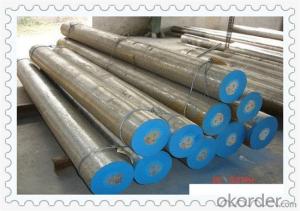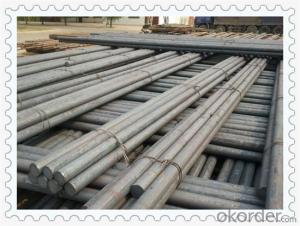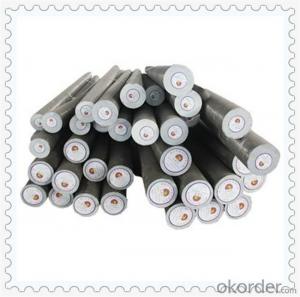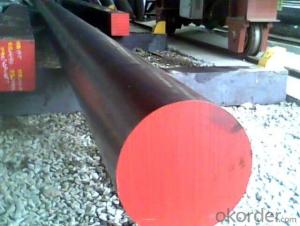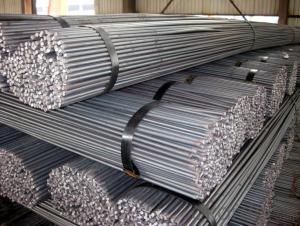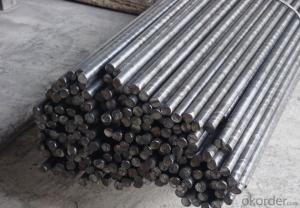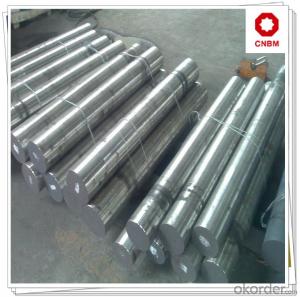Carbon Steel Rod Bar AISI 1050
- Loading Port:
- China main port
- Payment Terms:
- TT OR LC
- Min Order Qty:
- 30 m.t.
- Supply Capability:
- 10000 m.t./month
OKorder Service Pledge
OKorder Financial Service
You Might Also Like
Carbon Steel Rod Bar AISI 1050
Products Details
1, Size
Diameter : 10-1000mm
Length :1000-6000mm
2, Application
S50C structural carbon steel bar /1050 /50/C50 can be used to be manufactured forged gear, draw bar, roller,
shaft friction disc, shaft of machine tool, bent axle of engine, agricultural machanical plough share,
heavy load spindle and all kinds of shaft parts, minor damping spring and spring washer, etc.
3, Carbon Steel Round Bar Chemical Composition
Material | C | Si | Mn | S/P | B |
20# | 0.17-0.23 | 0.17-0.37 | 0.35-0.65 | 0.035(max) | 0.0008-0.003 |
25# | 0.22-0.29 | 0.17-0.37 | 0.50-0.80 | 0.035(max) | 0.0008-0.003 |
| 30# | 0.27-0.34 | 0.17-0.37 | 0.50-0.80 | 0.035(max) | 0.0008-0.003 |
35# | 0.32-0.39 | 0.17-0.37 | 0.50-0.80 | 0.035(max) | 0.0008-0.003 |
40# | 0.37-0.44 | 0.17-0.37 | 0.50-0.80 | 0.035(max) | 0.0008-0.003 |
45# | 0.42-0.48 | 0.17-0.37 | 0.50-0.80 | 0.035(max) | 0.0008-0.003 |
50# | 0.47-0.55 | 0.17-0.37 | 0.50-0.80 | 0.035(max) | 0.0008-0.003 |
55# | 0.52-0.60 | 0.17-0.37 | 0.50-0.80 | 0.035(max) | 0.0008-0.003 |
60# | 0.57-0.65 | 0.17-0.37 | 0.50-0.80 | 0.035(max) | 0.0008-0.003 |
4, Grade Equivalent
| GB | 20# | 30# | 35# | 40# | 45# | 50# | 55# | 60# |
| JIS | S20C | S30C | S35C | S40C | S45C | S50C | S55C | S60C |
| ASTM | 1020 | 1030 | 1035 | 1040 | 1045 | 1050 | 1055 | 1060 |
| C60 | ||||||||
| DIN | C22 | C30 | C35 | C40 | C45/CK45 | C50 | C55 | |
5, Characteristics
- High-hardness medium carbon structural steel.
- Low cold deformation ability and medium machinability.
- Poor weldability without temper brittlement.
- Low hardenability.
- Cracks is often caused during water quenching process.
- Using condition: normallizing and tempering after quenching and quenching on the high-frenquency surface.
- S50C/ 1050/ 50 can be used to be manufactured the machanical parts with high abrasice resistance
which can be used unde the condition of low dynamic load and impact effect.
6, Tests
HIC, SSC, SPWHT, Macrostructure, detection of defects, Hardness and DWTT test for pipelines steel plates are also available.
7, Surface Treatment
Black, chromate, fingerprint resistant treatment, slight oiled or non-oiled, dry.
Products Show
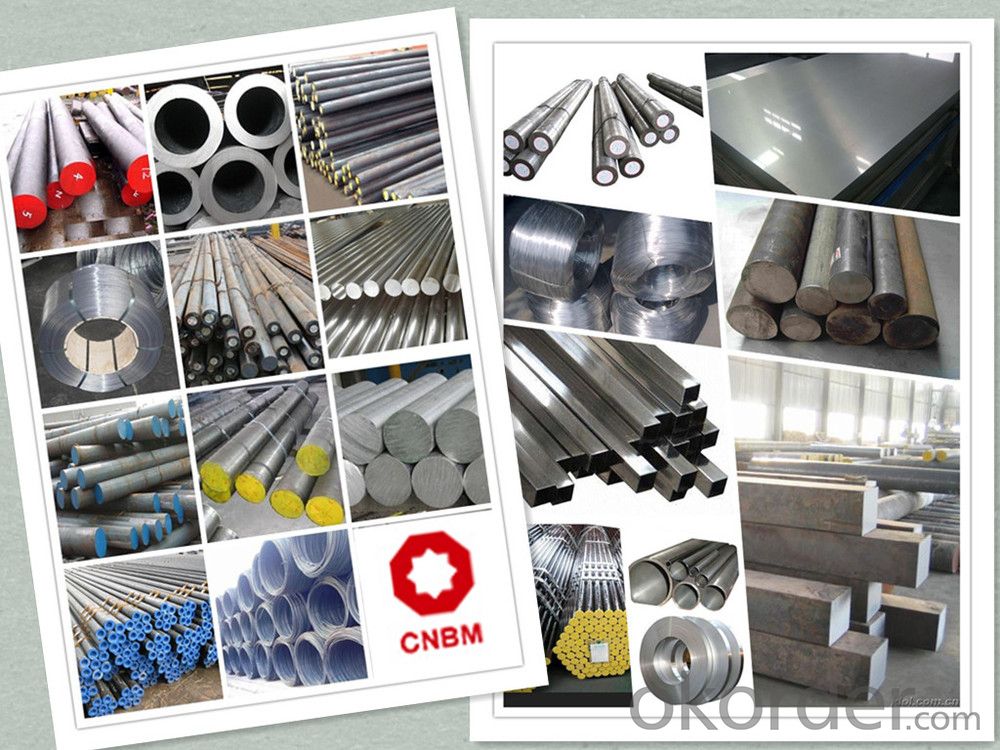
Product Overviews
| Product Name | Typical Grades | Diameter(mm) | Standard adopted |
| Carbon Steel | 20 (1020/S20C/C22) | Ø16-Ø300 |
GB/SAE/JIS/DIN
|
| 40 (1040/S40C/C40) | |||
| 45 (1045/S45C/C45) | |||
| Bearing Steel | GCr9 (51100/SUJ1) | Ø12-Ø250 | |
| GCr15 (52100/SUJ2/100Gr6) | |||
| GCr9SiMn (A485-Gr.1/SUJ3) | |||
Cr-Mo Steel | 20Cr (5120/SCr420H/20Cr4) | Ø12-Ø250 | |
| 40Cr (5140/SCr440/41Cr4) | |||
| 42CrMo(4140/SCM440/42CrMo4) | |||
| Gear Steel | 20CrNiMo | Ø16-Ø600 | |
| 20CrMn(5115/SMnC420/20MnCr5) | |||
| 20CrNiMo(8620/SNCM220/20CrMiMo2) |
Application
| Carbon Steel | Mold bottom, Plastic mold, Construction machinery parts Automobile parts, Security grills, Screens, Construction |
| Bearing Steel | Aerospace, Navigation, Nuclear energy, Chemical industry Electronic information, Petrochemical, Instrument and meter Transportation |
| Cr-Mo Steel | Mechanism & Fasteners gear, Stressed components for vehicles Engines and machines, Parts of larger cross-section |
| Gear Steel | All kinds of gears, Statically and dynamically stressed component for vehicles Engines and machine, Larger cross-section parts, Crankshafts |
Work Shop
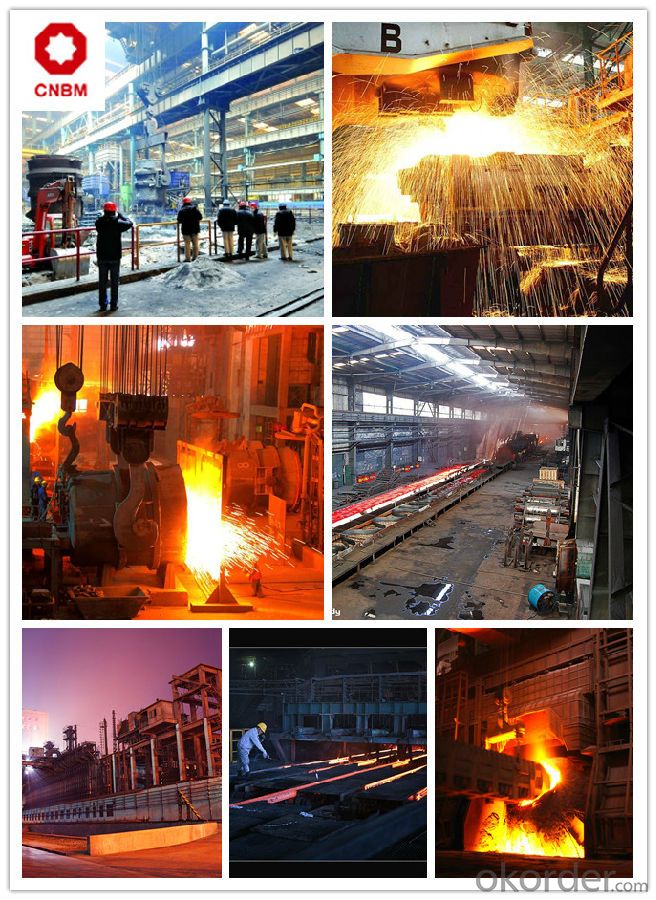
Company Information
CNBM International Corporation is the most important trading platform of CNBM group.
Whith its advantages, CNBM International are mainly concentrate on Cement, Glass, Iron and Steel, Ceramics industries and devotes herself for supplying high qulity series of refractories as well as technical consultancies and logistics solutions.

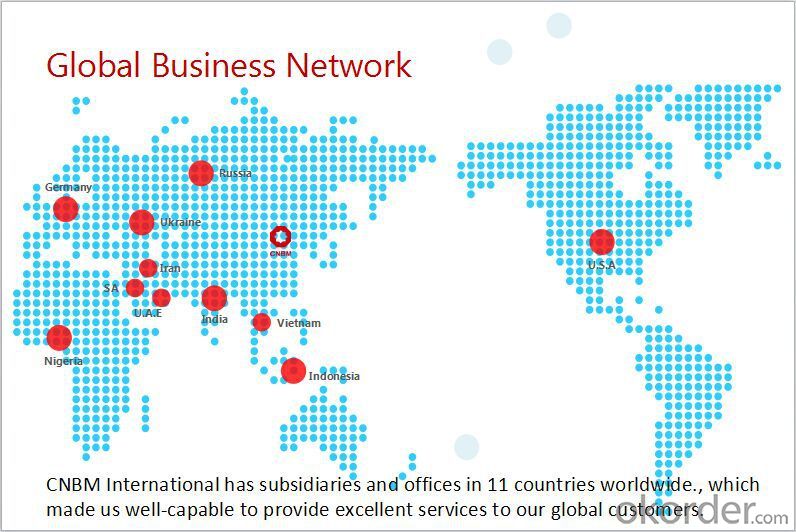
FAQ
1, Your advantages?
professional products inquiry, products knowledge train (for agents), smooth goods delivery, excellent customer solution proposale
2, Test & Certificate?
SGS test is available, customer inspection before shipping is welcome, third party inspection is no problem
3, Factory or Trading Company?
CNBM is a trading company but we have so many protocol factories and CNBM works as a trading department of these factories. Also CNBM is the holding company of many factories.
4, Payment Terms?
30% TT as deposit and 70% before delivery.
Irrevocable L/C at sight.
5, Trading Terms?
EXW, FOB, CIF, FFR, CNF
6, After-sale Service?
CNBM provides the services and support you need for every step of our cooperation. We're the business partner you can trust.
For any problem, please kindly contact us at any your convenient time.
We'll reply you in our first priority within 24 hours.
Packaging & Delivery
1, Packaging: seaworthy package or as required
2, Delivery: 35-45 days or based on quantity
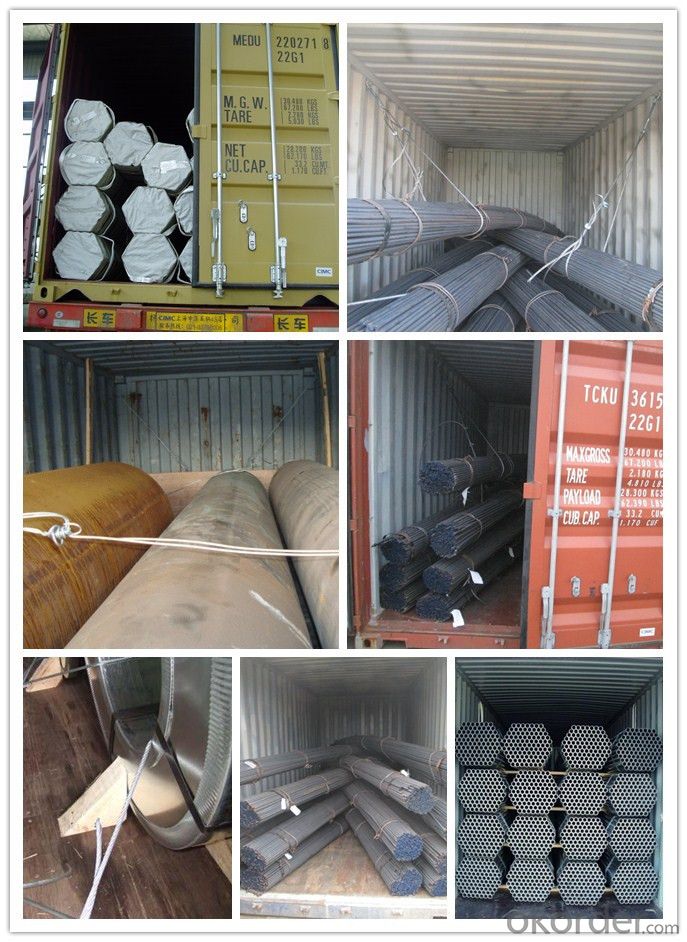
- Q:What are the different types of steel round bar alloys used in the automotive industry?
- In the automotive industry, there are several types of steel round bar alloys used due to their various properties and applications. 1. Carbon Steel: Carbon steel round bars are widely used as they offer good strength and toughness. They are used in various automotive components such as axles, crankshafts, and gears. 2. Alloy Steel: Alloy steel round bars contain additional alloying elements such as chromium, nickel, or molybdenum. These alloys enhance the mechanical properties of the steel, making it stronger and more durable. Alloy steel round bars are commonly used in automotive applications like suspension components, drive shafts, and steering components. 3. Stainless Steel: Stainless steel round bars are highly resistant to corrosion, making them suitable for automotive applications that require durability in harsh environments. They are commonly used in exhaust systems, fuel tanks, and body parts. 4. Tool Steel: Tool steel round bars have high hardness, wear resistance, and toughness. They are mainly used in the production of automotive tools and dies, such as punches, dies, and cutting tools. 5. Bearing Steel: Bearing steel round bars are specifically designed to provide excellent wear resistance and high load-carrying capacity in automotive bearings. These bars have a high level of hardness and are heat-treated to ensure optimal performance. 6. Spring Steel: Spring steel round bars are used in automotive suspension systems and other applications that require excellent elasticity and fatigue resistance. These bars can withstand repeated stress and maintain their shape, making them ideal for automotive springs and stabilizer bars. It's important to note that the specific choice of steel alloy depends on the desired properties, performance requirements, and cost considerations for each automotive component.
- Q:What are the advantages of using steel round bars in construction?
- There are several advantages of using steel round bars in construction: 1. Strength and Durability: Steel round bars are known for their exceptional strength and durability. They have a high tensile strength, which means they can withstand heavy loads and provide robust support. This makes them ideal for construction projects that require structural integrity and stability. 2. Versatility: Steel round bars come in various sizes and grades, offering versatility in construction. They can be easily shaped, bent, and welded to fit specific design requirements, making them suitable for a wide range of applications. Whether it's for building frameworks, reinforcement in concrete structures, or even decorative elements, steel round bars can be tailored to meet different project needs. 3. Cost-effectiveness: Steel round bars offer cost-effectiveness in construction due to their long lifespan and low maintenance requirements. They are resistant to corrosion, weathering, and pests, which reduces the need for frequent repairs or replacements. Additionally, their strength allows for the utilization of lighter construction materials, leading to potential cost savings in the overall project. 4. Fire Resistance: Steel round bars have excellent fire-resistant properties, making them a safe choice for construction. They do not burn, melt, or emit toxic fumes under high temperatures, which can be crucial in preventing the spread of fire and ensuring the safety of occupants. 5. Sustainability: Steel is a highly sustainable material as it is 100% recyclable. Using steel round bars in construction contributes to reducing environmental impact by minimizing waste and conserving natural resources. Additionally, the process of recycling steel requires less energy compared to manufacturing it from raw materials, making it an eco-friendly choice. 6. Availability and Quality Control: Steel round bars are readily available in the market, making them easily accessible for construction projects. Moreover, their production undergoes strict quality control measures, ensuring consistent and reliable material properties. This guarantees the structural integrity and safety of the constructed buildings or infrastructures. In conclusion, the advantages of using steel round bars in construction include their strength, versatility, cost-effectiveness, fire resistance, sustainability, availability, and quality control. These attributes make them a popular choice for builders and engineers seeking reliable and efficient materials for their construction projects.
- Q:How are steel round bars used in the manufacturing of conveyor systems?
- Steel round bars are commonly used in the manufacturing of conveyor systems due to their durability and strength. These bars are often used as the main structural components for conveyor belts, rollers, and pulleys. In conveyor systems, the steel round bars are typically used to form the framework or support structure of the conveyor. They are used to create the main body of the conveyor, providing stability and strength to withstand the weight and movement of the materials being transported. For instance, steel round bars are often used to create the conveyor belt support structure. These bars are typically bent or welded into a circular shape to form the rollers or idlers that support the conveyor belt. The bars are usually spaced evenly along the length of the conveyor, providing a stable platform for the belt to move on. Additionally, steel round bars are also used to create the pulleys that drive the conveyor belt. These pulleys are typically made of a solid steel round bar, which is machined to the desired size and shape. The pulleys are then mounted on the conveyor system and connected to a motor or other power source, which allows them to rotate and move the conveyor belt. Overall, steel round bars play a crucial role in the manufacturing of conveyor systems by providing the necessary strength and stability required for efficient material handling. Their durability and resistance to wear and tear make them a suitable choice for the demanding conditions of conveyor applications.
- Q:Can steel round bars be plated or coated?
- Yes, steel round bars can be plated or coated. Plating or coating is a common practice used to enhance the appearance, durability, and corrosion resistance of steel round bars. The plating or coating process involves applying a layer of another material onto the surface of the steel round bars. This can be done through various methods such as electroplating, hot-dip galvanizing, powder coating, or painting. The chosen plating or coating material depends on the specific requirements and desired properties of the steel round bars. For example, zinc plating is commonly used to provide corrosion resistance, while chrome plating can enhance the aesthetic appeal. Overall, plating or coating steel round bars can significantly improve their performance and extend their lifespan.
- Q:Can steel round bars be annealed?
- Steel round bars can indeed undergo annealing, a heat treatment process in which the steel is heated to a specific temperature and gradually cooled. This procedure serves to alleviate internal stresses, enhance ductility, and improve the steel's machinability. Annealing can be employed on various steel products, including round bars, to render them more pliable, easier to work with, and minimize the likelihood of cracking or failure in subsequent manufacturing procedures.
- Q:What are the different types of steel round bar heat treatments?
- Some common types of heat treatments for steel round bars include annealing, normalizing, quenching and tempering, and case hardening.
- Q:What are the different types of steel round bar finishes for decorative purposes?
- There are several different types of steel round bar finishes that can be used for decorative purposes. Some common options include polished, brushed, hammered, and antique finishes. Each of these finishes provides a unique aesthetic appeal and can be chosen based on the desired look and style for the decorative application.
- Q:How are steel round bars used in the manufacturing of material handling equipment?
- Steel round bars are commonly used in the manufacturing of material handling equipment due to their strength and durability. These bars are often used as components in the construction of various equipment, such as cranes, forklifts, conveyors, and hoists. One of the primary applications of steel round bars in material handling equipment is for the construction of load-bearing structures. For example, in cranes and hoists, steel round bars are used to create the mast, boom, and jib, which need to withstand heavy loads and provide stability. The high tensile strength and resistance to bending of steel make it an ideal choice for these critical components. Additionally, steel round bars are used for shafts and axles in material handling equipment. These components play a crucial role in transmitting power and torque, allowing the equipment to operate efficiently. Steel's ability to withstand high stress and torsional forces makes it a suitable material for these applications. Another common use of steel round bars in material handling equipment is for the fabrication of lifting attachments and hooks. These bars are often shaped and welded to create the required lifting mechanism, ensuring that they can safely lift and transport heavy loads. The strength and rigidity of steel make it capable of withstanding the forces exerted during lifting operations. Furthermore, steel round bars are used in the manufacturing of conveyor systems. These bars are utilized as rollers or shafts to support and guide the movement of materials along the conveyor belts. The smooth surface of the steel bars reduces friction, allowing for efficient material handling. In summary, steel round bars play a vital role in the manufacturing of material handling equipment. Their strength, durability, and versatility make them suitable for various applications, including load-bearing structures, shafts, lifting attachments, and conveyor systems.
- Q:What are the considerations for selecting the right steel grade for a round bar?
- There are various factors to consider when choosing the appropriate steel grade for a round bar. To begin with, the intended application of the round bar should be taken into account. Different steel grades possess distinct properties that make them suitable for specific purposes. For instance, stainless steel or high-alloy steel, which have exceptional heat resistance, would be ideal for use in high-temperature environments. Conversely, carbon steel, with its good strength and ductility, may be more appropriate for structural applications. Another factor to consider is the desired mechanical properties of the round bar, including tensile strength, yield strength, hardness, and toughness. These properties can vary significantly among different steel grades, so it is crucial to select a grade that meets the specific requirements of the application. Corrosion resistance is also an important consideration. If the round bar will be exposed to corrosive environments, such as in marine or chemical applications, it is advisable to choose a stainless steel grade with high resistance to corrosion. On the other hand, if corrosion resistance is not a major concern, a carbon steel grade may be more cost-effective. Cost is another factor to be taken into account. Different steel grades have varying costs based on availability, demand, and manufacturing processes. It is important to strike a balance between the desired properties of the round bar and the available budget to ensure cost-effectiveness. Moreover, the manufacturability of the steel grade should be considered. Some steel grades may be more challenging to machine or weld, which can impact the production process and cost. It is crucial to select a readily available steel grade that can be easily processed to meet the required specifications. Finally, it is always advisable to seek guidance from steel suppliers, engineers, or metallurgists to ensure that the chosen steel grade aligns with the specific requirements of the application. Their expertise and experience in the industry can provide valuable insights and recommendations.
- Q:What are the environmental considerations of steel round bars?
- Steel round bars pose several environmental considerations. Firstly, the extraction of iron ore, which is necessary for steel production, can have adverse effects on ecosystems and habitats. The mining process can cause deforestation, soil erosion, and the release of harmful pollutants into the air and water. In addition, manufacturing steel round bars requires a substantial amount of energy, often derived from non-renewable sources like coal and natural gas. The combustion of fossil fuels for energy contributes to greenhouse gas emissions and climate change. The steel industry is a major global emitter of carbon dioxide. Furthermore, the transportation of steel round bars also has environmental consequences. When steel products are shipped over long distances, it contributes to carbon emissions and air pollution. This is particularly significant when steel is imported or exported over vast distances. However, it is crucial to acknowledge that steel is a highly recyclable material. By recycling steel, the need for new production is reduced, energy is conserved, and the environmental impacts related to mining and extraction are decreased. By opting for steel round bars made from recycled steel, individuals and industries can contribute to a more sustainable and environmentally-friendly approach. In summary, the environmental considerations of steel round bars encompass the impacts of mining and extraction, energy consumption during production, and transportation emissions. Nevertheless, the recyclability of steel presents an opportunity to mitigate these environmental impacts and foster a more sustainable steel industry.
1. Manufacturer Overview |
|
|---|---|
| Location | |
| Year Established | |
| Annual Output Value | |
| Main Markets | |
| Company Certifications | |
2. Manufacturer Certificates |
|
|---|---|
| a) Certification Name | |
| Range | |
| Reference | |
| Validity Period | |
3. Manufacturer Capability |
|
|---|---|
| a)Trade Capacity | |
| Nearest Port | |
| Export Percentage | |
| No.of Employees in Trade Department | |
| Language Spoken: | |
| b)Factory Information | |
| Factory Size: | |
| No. of Production Lines | |
| Contract Manufacturing | |
| Product Price Range | |
Send your message to us
Carbon Steel Rod Bar AISI 1050
- Loading Port:
- China main port
- Payment Terms:
- TT OR LC
- Min Order Qty:
- 30 m.t.
- Supply Capability:
- 10000 m.t./month
OKorder Service Pledge
OKorder Financial Service
Similar products
New products
Hot products
Hot Searches
Related keywords

